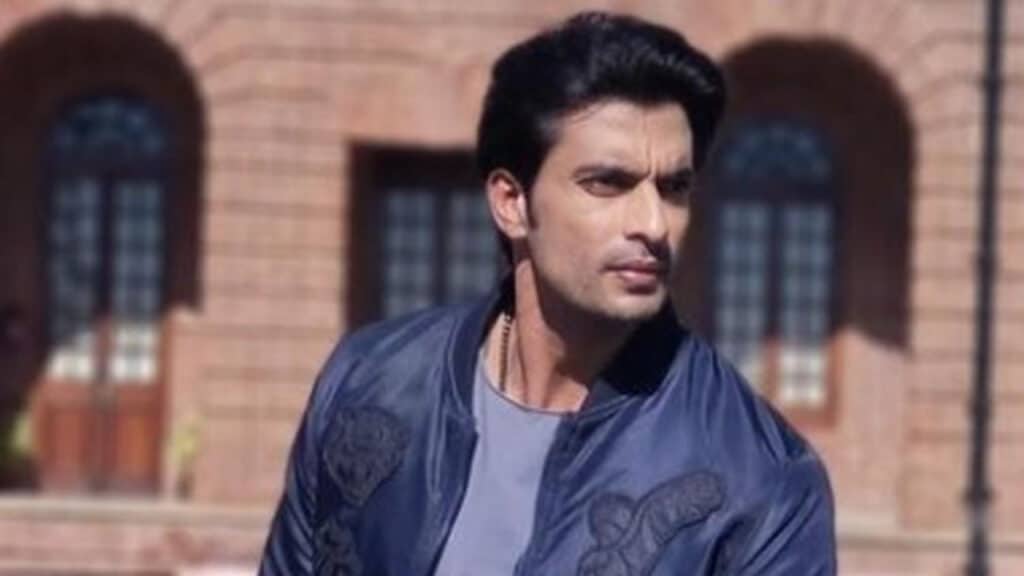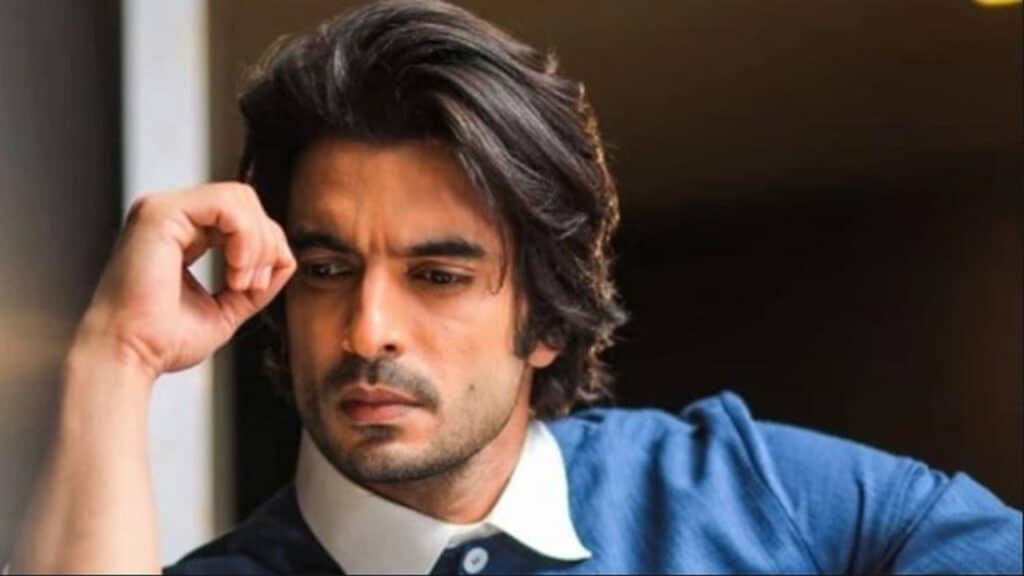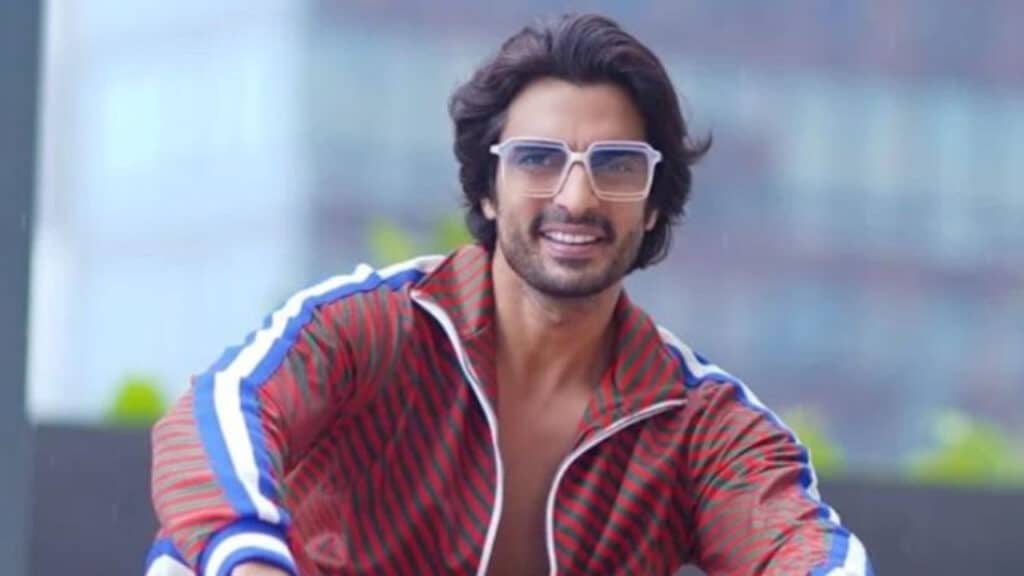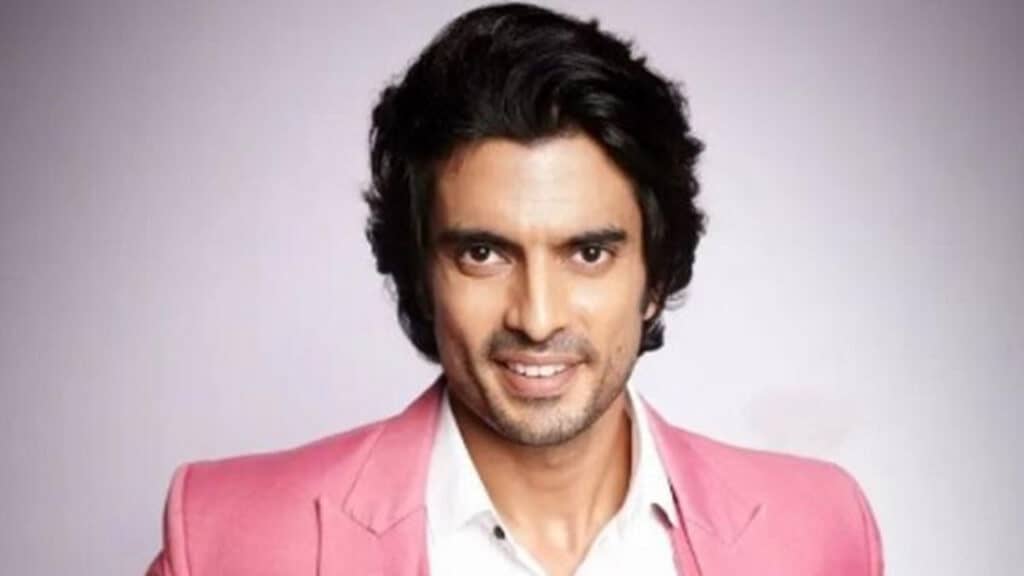Actor Gashmeer Mahajani, in an exclusive tête-à-tête with Cutting Shots, talks about taking up broken characters, his learnings as an actor from Kamal Haasan and Fahadh Faasil and more.

It’s a busy Saturday afternoon when I ring up Gashmeer Mahajani. “I have my small boy with me on the sets today,” he tells me and breaks into a laugh. The excitement in his voice is palpable. In the background, I can hear little Vyom’s animated chatter while his daddy dearest caters to him.
It reminded me of the time when in the midst of one of our interviews with Shah Rukh Khan at Mehboob Studios, a hoodie-clad Abram had suddenly walked into the room with his spidey figurine and cutely exclaimed, “Papa, guess who,” followed by King Khan playing around. Truly, no love is greater than that of a father for his son!
Cut to present, a few minutes later, Gashmeer rejoins me and settles down for a heartfelt chat on being drawn towards broken characters, his love for Kamal Haasan and Fahadh Faasil’s craft, his love-hate equation with social media and more.
Excerpts from our engaging conversation with the actor –
Q. In recent years, the characters that you have taken up so far, be it Aditya Kumar Tripathi from Imlie, Viraj Trehan from Tu Zakhm Hai or Armaan Oberoi from Tere Ishq Mein Ghayal, there is one common thread between all of them and that is, their conflicts are more internal. Are you subconsciously more attracted to characters that are broken in their own way?
A. I think I get approached for characters which are always broken. Pulling off such roles is a complex process. Even if a person is laughing, there could be sadness in his eyes. If a person is sad, there could be different layers of sadness to it. As an actor, I enjoy getting to that core. It isn’t a conscious decision as such but the roles that are coming my way are those kinds of characters. Secondly, I feel that every character has some damage inside them. Sometimes, it is not even written in the script. Nobody comes and tells you, ‘Oh this is a damaged character or you have to play a damaged character’ (laughs). It is something that the actor has to discover.
Viraj Trehan was already a damaged character who had gone through a lot of trauma, but Aditya from Imlie was never a broken character. He started facing damage on the way. That damage had to be discovered by me as an actor during the reading sessions and the shooting process. An actor charges money because he has to find something hidden in those few lines given to him. He is just given the dialogues and the situations. The damage has to be found by the actor.
My character Armaan Oberoi from Tere Ishq Mein Ghayal is a good guy. But the damage in him happens because of the situations that he is put into. Now, that has to be found by me. If you compare all the three characters, you would find Viraj to be wilder and more volatile than Aditya and Armaan.
Q. When Ian Somerhalder was doing The Vampire Diaries, he had mentioned in one of his interviews that he was inspired by actors like Cary Grant and Jack Nicholson to craft his supernatural character the way he did. He felt that whether they were being an antagonist or protagonist, there’s always something in their eyes where one could never tell what they were thinking. Speaking about your character Armaan in Tere Ishq Mein Ghayal, he doesn’t blink much which reminds me of Jenna Ortega who tried something similar in the Netflix series, Wednesday. She revealed that this technique helped her to maintain the intensity of her scenes. Did you have any reference point for Armaan?
A. No, I didn’t have any reference point at all. For me, deriving inspiration is a continuous process; be it from the actors from the west or the ones from our own country like Vijay Sethupathi or Irrfan Khan. For me, the greatest performance of all time is that of Irrfan Khan in Maqbool. Just look at the kind of pain and depth that his eyes had whether he is having a light or a hard moment in that film!
I feel that if I take two or three reference points while I am doing one particular character, I am just limiting my perspective to those actors. That becomes a very shallow process for me.
Over a period of years and even before I started my acting career, I watched a lot of movies, observed many actors and directors. I saw many narratives, worked at the ground level on sets, and did theatre. All these things are always at the back of my mind. Whatever is there in your subconscious, it stays there and that automatically reflects in your work. So, whatever you see in Aditya or Armaan’s eyes, it isn’t a deliberate move. It has become a part of my personality because it’s an ongoing process.
In between the shots or scenes, all I am doing is reading or watching new stuff. All of these things are accumulating in my subconscious mind which is conveyed to you unknowingly when I am doing a scene. I believe that should happen with every actor for that matter. It is said that if you want to act, you cannot learn how to act from anybody. You can learn a few techniques or gimmicks. But if you really want to act, you have to observe, watch, read and keep your eyes and ears open.
The reference point thing might work for other actors but it doesn’t for me.

Q. While you and Karan Kundrra play rivals on screen, the two of you share a breezy camaraderie off camera which is quite evident on social media as well. Do you feel that this warm equation helps you both to be on the same page when you are enacting your scenes together?
A. Karan has been working in the TV industry for many more years as compared to me. I have been working in Hindi commercial television for the past two and half years. So, I feel the camaraderie does help because you become a little giving while you are doing your scenes. I have a certain approach towards my thing. When there is a two-hero project, the other actor will also have his own approach. At times, something that I am doing might not go in sync with what he wants to do in that scene. That’s when the camaraderie helps. At times, I say, ‘Accha tu aisa kar raha hai toh main aisa kar leta hoon’ or if I say, “Nahi nahi mujhe aisa hi karna hoga warna mera character bigad jayega,” in those times, he steps back and says, “Theek hain tu aisa kar raha hai, tu kar le. Main mere isme thodasa adjust kar leta hoon.” I think this kind of understanding is obviously because of the camaraderie that we share. We end up giving each other when we are doing our scenes. So, clashes don’t happen at all. That’s the only place where camaraderie helps.
Our camaraderie is not like we go out for dinners, spend time with each other, party or drink beer together. It’s strictly professional but we hit off really well. When I come to the set, my only prerequisite with my co-actor is that I am totally committed to my work and I will only talk and discuss about the script. If you are also doing the same thing then our bond automatically develops. In the first 15-20 days, I realised that Karan was also doing the same thing. He too used to come to the sets, take his script and rehearse. So, we eventually developed a bond of respect for each other because of our approach towards work.
Q. There’s a famous quote by American actor Sanford Meisner which says, ‘Acting is behaving truthfully under imaginary circumstances.’ Now, that’s where the conviction part comes into picture. As an actor, the first thing that you do is to find a relatable point in the character, build it up and add layers. But that may not always be the case. Sometimes, the characters might not have anything relatable to you in them. Have you faced such instances and how do you sail through them?
A. For Armaan, in the beginning of the show, I wasn’t finding any relatable point in him because he is a werewolf with superpowers which I am not in real life. So, it was impossible for me to relate to him (laughs). But after a while, I started looking at his human side and began to connect with him.
So far in my career, I haven’t done any roles which I am not able to relate. If I don’t find anything relatable in my character then I won’t do it. I feel that if I don’t relate to the character then I will just end up hamming on the set. Then, there is no point in doing that role.
After reading a couple of episodes or maybe half of the screenplay, if I think that I am not getting anything relatable in the character then that role might not excite me. I believe in that case; you shouldn’t take up the character. I haven’t done such roles so far.
Like I played Chhatrapathi Sambhaji Maharaj on screen. Now, that’s a biopic; it isn’t an imaginary character. But there were certain aspects of him that excited and triggered me and I connected with those. Now, I can’t change that character as per my will or make him Gashmeer Mahajani unlike Armaan or Aditya whom I can make like myself because these are imaginary characters. You can’t do that in biopics. But still the relatability factor has to be there for me.
Q. Are you somebody who is okay with giving multiple retakes? Do you check yourself frequently on the monitor?
A. It depends on take to take. At times, when I am not sure, I do check myself on the monitor immediately. When it’s a close-up shot featuring two actors and if I feel that my take is correct and the other actor is asking for a retake then I tell them to retain mine and go ahead. Sometimes, even without checking the monitor, I know that this was it and at times, I go for multiple takes if I don’t feel that it’s my best shot. Thankfully, the directors that I have worked with so far, have been co-operative and understanding. There are no clashes on that end and so, it becomes peaceful to work.

Q. Recently, during an AMA session on Instagram, on being asked by someone about what question you would like to ask your fans if given a chance, you replied that you would like to know if you should change or not, because if you do then that will dilute your art. What was your thought behind that answer?
A. Usually, I give very outright answers. I always did that but suddenly what happened is that in the last few years, I got introduced to the world of TV. Before that when I was doing Marathi cinema, I would be very outright and blunt in my interviews and everyone was okay with that. But now with the growing social media culture, sometimes you find fake accounts being made just to belittle you and then you realise that it’s all futile.
What these trolls don’t realise is that their mean comments make no difference to the actor or his career. I feel such things should be read and ignored.
Having said that I believe, as long as one is not being abusive which might get ugly, everyone has the right to voice his or her opinion.
Now, sometimes when people don’t like a particular fictional character, they start associating the qualities that they dislike about that character with that of the real person (actor). They start thinking that the person is also bad. In that case, if I give a blunt answer then they twist it, make conspiracy theories and attach it to my current show. I don’t read most of them but some of my fans do point out these things to me.
The answer that I gave during that AMA session was for my dedicated fans who have been following my work since years. I do care for them. They give constructive feedback on my work and shower a lot of love.
At times, my fans tell me to refrain from saying certain statements and I am like that’s my personality. Speaking my mind is always something that I have done. Now because of a few hundred faceless people twisting and saying bad things about it, I can’t be bullied by them. This is something that I was trying to put across to my fans. I can’t change myself for these faceless people who make no difference in the real world. The bluntness and clarity of thoughts with which I speak, might be controversial at times or slightly against societal norms. But, it’s never vulgar or cheap or abusive. My performances stem from the kind of thoughts that I have. If I change my thinking or talking process even my performances will be mediocre.
Q. You often mention that Kamal Haasan and Fahadh Faasil are two of your favourite actors. What is that one big learning that you feel you have taken from each of their craft or their work that you have watched?
A. Speaking about Kamal Haasan, not just acting, I feel my work ethics are deeply inspired by his journey in the industry. He has touched every aspect of filmmaking in one way or the other. The basic ideology that I have or the philosophy that I have as a student of cinema, is inspired by him.
I feel there’s something extremely organic and real about Fahadh Faasil’s performances. Like I was saying previously, sometimes you are laughing but there’s a certain amount of sadness in you. You should check out this film of his called Njan Prakashan. In the climax of that film, you see Fahadh narrating a serious story to the girl. Towards the end of it, she laughs while he sports a serious expression with tears in his eyes. The switch that he makes, for a moment you don’t realise or understand whether he is making a sad expression to make her laugh or he is actually sad. He is walking such a thin line there. Now, I have seen innumerable such scenes in movies. But you cannot preempt that tragedy because of Fahadh in that scene. He leaves you so engrossed in his performance that by the time the camera pans and you see the girl lying on the floor, it hits you miserably. That’s a sign of a brilliant actor.
Subconsciously, Fahadh knew that it’s a very clichéd scene which has been tried and tested in many films so far. So, he did that scene in such a way that you do not focus on anything else but try to figure out what he is trying to do. He distracts you so well out of the succeeding scene that you can’t preempt what’s coming up.
These minor brilliant nuances that he does in his films are amazing. What I like about him is that he always plays characters that are underdogs and not the typical toxic male. You root for his characters. He chooses to do characters which are real. I am sometimes dumbfounded by his capacity to make such characters lovable.
Q. There was a time when Indian cinema was often dismissed as being too musical when on the other hand, this form of story-telling is very unique to our subcontinent. As an artist and as someone who has choreographed his own songs in films, do you feel RRR song ‘Naatu Naatu’s historic win at the Oscars this year will bring about a change in this perspective?
A. I think that change has started happening over a period. Not just only on the international level, I believe the perspective of our own people has also changed. The biggest thing that happened in the lockdown is that people got exposed to a lot of international content. Now the kind of rejections that we are getting in theatres, according to me, there is a reason for it. Firstly, we are going through an economic crisis so people don’t have the capacity to spend large amounts every week on every film that is released. They would prefer to wait for a few months and watch some films on OTT instead. They will spend large bucks on movie tickets only if they hear extraordinary things about a film.
Now, makers will have to forgo that routine song-and-dance part unless it is taking the narrative ahead or once in a blue moon, an item song which goes well with the film. There’s no doubt that the win of ‘Naatu Naatu’ has given us a huge global exposure.
Also here, I would like to mention the other Oscar winning film, The Elephant Whisperers as well. It’s a huge validation for documentary filmmakers as well as for cinema. It’s termed as a documentary but it’s still a film. The couple that they have shown there are like the hero and heroine of the film. The movie has been directed like any other fictional story. It’s a full-fledged film and it getting any Oscar for the entire filmmaking process and not just a part of it, is a big win for India and will motivate filmmakers here.

Q. As of now, you have dabbled with many genres like romance, thriller and dance but we haven’t seen you in the comedy space yet. Of course, your character in Shrikant Bashir had his own sense of humour but you haven’t done any out and out comedy yet. Do you have any plans of exploring that space?
A. Yes, definitely. There are three spaces that I want to explore on a big scale- comedy, musical and horror. I want the horror genre to be explored seriously; something on the lines of The Conjuring and Shining. I would also like to do comedy. But there’s nothing happening in that genre around me. I just hope that I get something in that space in near future.
Q. When a director approaches you with a script, besides the monetary aspects, what’s the first thing that comes to your mind, the novelty of the concept or its universal appeal?
A. While approaching a script, which out of these two things will strike first differs each time. Initially, I try to find one good point in the script which will tell me that let’s give it a shot. I feel very seldom do you get an out and out pitch perfect script. If I find one or two things great then the struggle begins. I tell the director the things that I liked and then we discuss the treatment of the script. We brainstorm on it for one or two months and if we come on the same page then we decide to work on it.
The first time I do is try to find out if I click with the character. Then, I tell the director what I liked about my character and let them know how I am going to approach it. If it’s okay with them then I go ahead.
Like for Tere Ishq Mein Ghayal, they always wanted the softer side of Armaan. I told them that I won’t restrict him to the softer side because he is a werewolf. He will have a certain amount of swag and cruelty to his personality, but he will always be good but not cocky. So, my version of the werewolf is cute and sweet but he will have his devious side peep out at times. The makers agreed with my suggestion and we went ahead with that.
Q. Lastly, you have a lot of things in the pipeline. Post Tere Ishq Mein Ghayal, there’s Chhori 2, Pravin Tarde’s Mulshi Pattern 2 and a two-part film on Chhatrapati Sambhaji Maharaj. You always say that you pour a part of yourself in all the characters that you play? So, how do you replenish that creativity energy as an actor?
A. I don’t get burnt out. It’s actually the reverse for me. I feel rejuvenated. For example, once I wrapped up playing Viraj, it was like so many things inside me came out through that character. I felt refreshed and was excited about the next project. I feel lighter, nicer and happier after I finish a character. I enjoy the whole process.
In psychology, it is said that if you always keep your emotions suppressed inside you, it can lead to depression or make you feel low. People seek therapy because it gives them a chance to speak out. You start feeling lighter after you talk it out. You let that damage out completely in front of somebody. As an actor, I feel blessed that I can pour out those emotions through my characters; be it Aditya or Viraj or any other character. In fact, I heal myself while doing that. I can voice out my suppressed emotions through a character.
Also, you feel a sense of achievement after you finish a difficult character. If you have done a genuine piece of work, you will feel happy about it. One might take a few weeks of break to get out of the physical exhaustion. But beyond that, the mind is enriched by creating something cinematic. Once you start looking out for more things then you become more hungry and greedy to explore new things.
